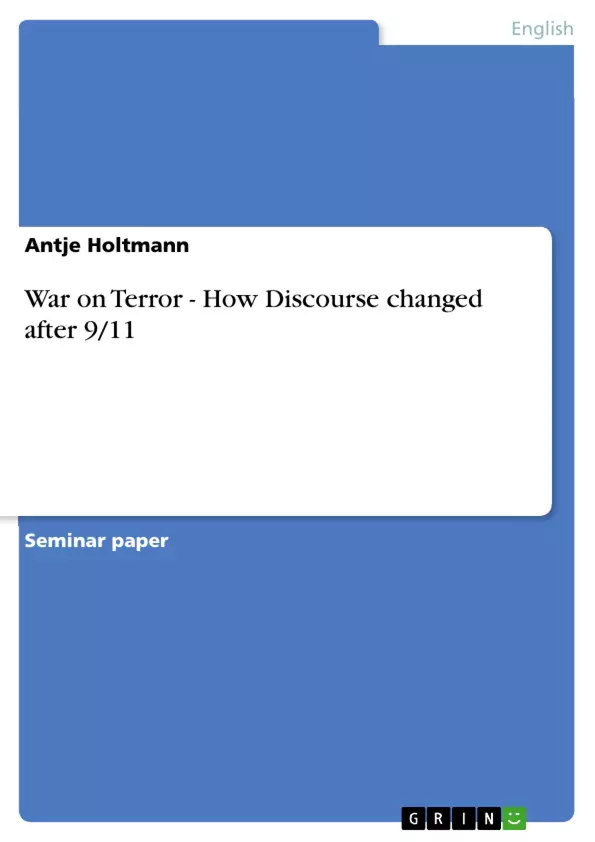[...] The discourse he (re)started, continued or resumed on “shaped public discussion and debate surrounding terrorism worldwide”. '9/11' has become a term everybody understands “in its conventional sense, as a realm of creative expression” as Daniel J. Sherman and Terry Nardin point out in their book Terror, Culture, Politics: Rethinking 9/11. Also Shana Kushner and Amy Gershkoff say that '9/11' has become an “ideograph in the sense that the historical event represents an attack on the beliefs, values, attitudes and “way of life” within the United States”. Not only in the English language '9/11' has become a “dictum” but in many others, too. In this term paper I want to take a closer look on the speech President Bush delivered on September 20, 2001 as State of the Union Address to a joint session of Congress. In my analysis I will go through the speech step by step in order to figure out the main points Bush is making. From there I want to continue with its effects and influence on the discourse about 'war on terror'. I am mainly referring to Norman Fairclough and his interpretations in Language and Globalization and also to Kevin
Coe et al. and their study No Shades of Gray. With the help of these publications I want to emphasize the impact and the aftermath of Bush's discourse as well in media as in society.
Inhaltsverzeichnis (Table of Contents)
- Introduction
- Analysis of the speech
Zielsetzung und Themenschwerpunkte (Objectives and Key Themes)
This term paper aims to analyze President Bush's State of the Union address on September 20, 2001, focusing on the key points made in the speech and their impact on the discourse about the "war on terror". The paper will explore the speech's language and structure, highlighting rhetorical devices used to shape public opinion.
- The impact of Bush's speech on public discourse and media
- The use of language to create a sense of unity and purpose
- The rhetorical construction of a dichotomy between "us" and "them"
- The significance of the "war on terror" declaration
- The influence of historical references and examples
Zusammenfassung der Kapitel (Chapter Summaries)
- Introduction: This chapter introduces the context of Bush's speech, highlighting its importance in the aftermath of the 9/11 attacks. It discusses the speech's reception in the media and its significant impact on public discourse.
- Analysis of the speech: This chapter provides a detailed analysis of Bush's speech, examining its structure, key themes, and rhetorical devices. It focuses on the recurring use of the words "terror" and "freedom" as well as the dichotomy created between "us" and "them." The chapter also explores the speech's four main questions and the central declaration of "either you are with us or you are with the terrorists."
Schlüsselwörter (Keywords)
Key terms and concepts explored in this work include: "war on terror", "terrorism", "freedom", "justice", "al Qaeda", "Taliban", "Islamic extremism", "dichotomy", "rhetoric", and "public discourse".
Frequently Asked Questions
What is the main focus of this analysis of President Bush's 2001 speech?
The paper analyzes the State of the Union Address delivered on September 20, 2001, focusing on how its rhetoric shaped the global discourse on the "War on Terror."
Why is "9/11" considered an "ideograph" in this context?
As an ideograph, the term represents an attack not just on a building, but on the core beliefs, values, and "way of life" of the United States.
What rhetorical dichotomy did Bush create in his speech?
Bush established a clear dichotomy between "us" (freedom-loving people) and "them" (terrorists), famously stating, "either you are with us or you are with the terrorists."
How did the speech influence media discourse?
The analysis shows that the media largely adopted the speech's terminology, reinforcing a "no shades of gray" perspective on international relations and terrorism.
What are the four main questions Bush addressed in the speech?
The speech was structured around who attacked the US, why they hate Americans, how the war will be fought, and what is expected of the citizens.
Which linguistic experts are referenced in the study?
The paper refers to Norman Fairclough's work on language and globalization and the study "No Shades of Gray" by Kevin Coe et al.
- Quote paper
- Antje Holtmann (Author), 2010, War on Terror - How Discourse changed after 9/11, Munich, GRIN Verlag, https://www.hausarbeiten.de/document/211626


